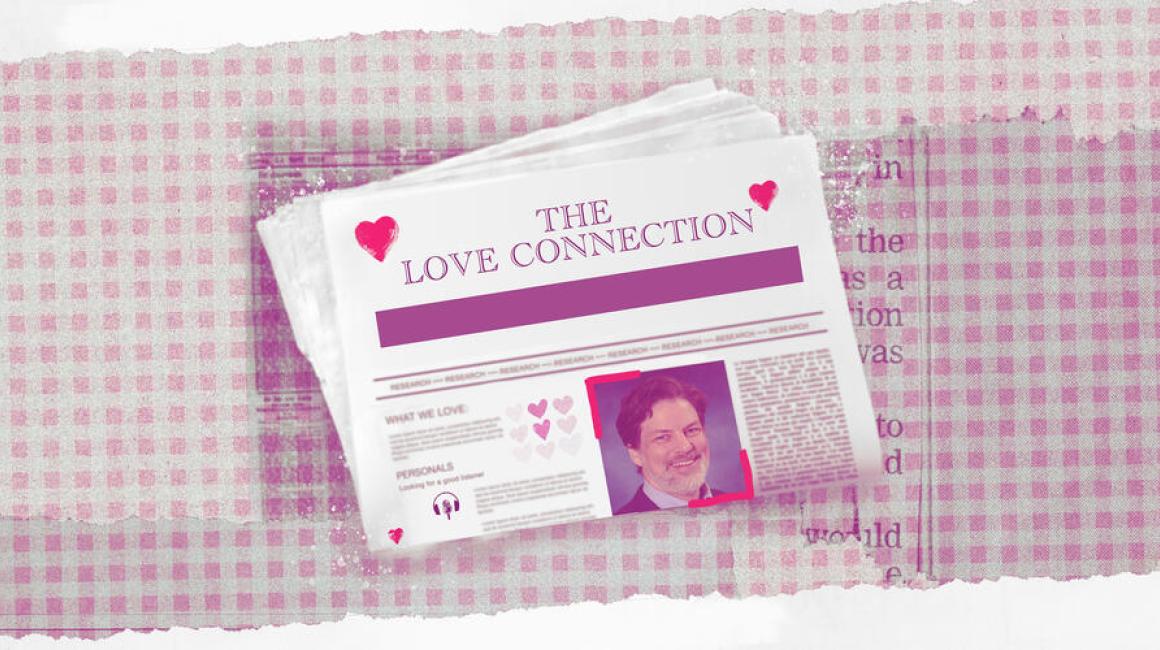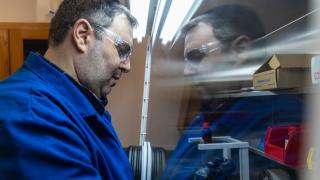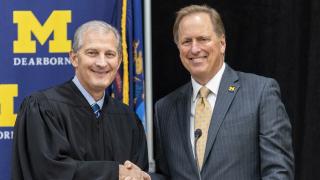
I love it. I love it not. Wait…can we really feel love for a thing? And, if we can, what does that say about us?
College of Business Marketing Professor Aaron Ahuvia has been studying questions related to consumer-based love connections for decades. To find answers, he’s consistently researched the psychology of how brands, money and spending influence our happiness — it’s made him a “Brand Love” pioneer who earned the first Consumer Brand Relationship Association’s Lifetime Achievement Award and he’s internationally known as a leading expert on brand love.
“I was hardly the first person to notice that people love things. But to my good fortune, I was the first person to collect scientific data specifically on this kind of love. It has remained a research interest of mine for more than 30 years.”
Ahuvia’s findings have been featured in The New York Times and on National Public Radio. When Oprah had a talk show, Ahuvia was on it. And now he’s got a book coming out that dives into this hot topic, The Things We Love: How Our Passions Connect Us and Make Us Who We Are. (Little, Brown and Company, 2022)
Ahuvia works his research into his UM-Dearborn marketing classrooms to help students better understand consumerism today. When Ahuvia isn’t on campus, he’s working with Fortune 500 clients — like Google, L'Oreal and Samsung — to look at brand impact and effectiveness.
And he says that love does have something to do with it.
“There is scientific evidence that our love for things is really love,” he said. “But it’s important to note that this doesn’t mean that our love for things is the same as our love for people. Love comes in many forms.” This scientific evidence includes noticing that oxytocin — the brain hormone that’s linked with triggering feelings of love and protection — played a role in bonding people to their favorite brands.
In honor of the Valentine’s Day holiday, we asked him what he's learned when it comes to love and a few of our favorite things.
Our love continues to evolve.
Aaron Ahuvia: “First I’ll share a bit of science: The brain’s neocortex is essential for love and many other aspects of social relationships. Our neocortex has evolved to become very large; humans have the largest brain relative to body size of any animal due to it. But this isn’t a physical advantage. Our brains use up to 10 times as many calories per unit of mass than our skeletal muscle. That means even though our brain only makes up 2% of our body weight, it uses up 20% of our daily calories. So why would we evolve to have a larger brain?
One reason is because of the role that love plays in our lives. In all sorts of animal species, the main purpose of a larger brain is to allow for more complex and cooperative relationships between parents. Species that mate monogamously and parent their offspring have significantly larger brains than species that don’t.
In humans, this love bond expanded — along with the size of our neocortex — to form bonds in people outside of our immediate family. This allowed us to have even more powerful social organization based on a shared willingness to make sacrifices for other people. So it went beyond parental, romantic and familial love and expanded into the type of platonic love we feel for friends or neighbors.
Objects do not fall into these person-to-person categories of love — our love for people is different than our love for things — but there is definitely a bond occurring. The Industrial Revolution plays a role in love expanding to things. The access to more items gave opportunities for people to make associations with them. But the Industrial Revolution went far beyond simply inundating us with stuff. It also led to a profound cultural change: It increased individualism. As our Western society became richer, people got more choice over how they wanted to define their identity. So it became more common for objects to become a reflection of who you are and create an extension of self. That connection to a person’s identity plays a big role in why a brand or item rises to love status.”
The things we love are often people in disguise.
Ahuvia: “We are exposed to many things every day. Sure, there are a lot of things we like — but the items that evoke a stronger response are a chosen few. Of course, the product needs to be useful to you on some level and be a good item for you to connect with it. But there is an added layer going on with the things we love — the product is often representative of a person or people.
Typically, with everyday objects, we have person-thing interactions. But the things we love are often person-thing-person. For example, a student might love U-M because of the way it connects her to her friends. In that case, the person-thing-person would be student-campus-friends.
However, there is a downside to this: Your love for the product rises and falls depending how you feel about the person or people. For example, if you are upset with your favorite quarterback, you might be angry at your jersey and not wear it.”
Most things are superficial — but loved objects are not.
Ahuvia: “I have been doing research studies about love for decades — starting with personal dating ads in the 1980s before moving over to the market research side. Just like people, most brands aren’t likely to appeal to everyone. But there will be a few people who absolutely love them.
In one survey of 720 people, we asked which brands they loved. Participants named thousands of brands. We found that for every brand loved by over 100 people, there were hundreds loved by just one person. So there really is something for everybody.
Advertisers spend a lot of money trying to get us to care about their products. They collectively spent $724 billion in 2017. That’s a lot of money to explore bonds that often happen in unpredictable ways. So what do we know? As a researcher, I’ve learned that brands need to go beyond the superficial. It’s just like how when we’re single we’re attracted to good-looking people, but to fall in love there needs to be something more — like having a match to our values or being a partner to reach goals with — for that person to become a ‘keeper.’
There’s also that feeling of ‘rightness’ about an object that makes us feel that it is authentically part of who we are, like it has taken a part of our identity and made it visible. For a musician, that might be a family heirloom violin. Or, for a marathon runner, a certain type of shoe in your favorite color. With all the products available in the world, you connected with the right one. It’s kind of how we view the elusive Mr. Right.
The way companies get there is to stay true to who they are and know that there is someone out there, even right now, who is madly in love with their product. We can’t all be the Apples or Samsungs of the world — and I believe they are widely loved because of the frequency people interact with their products and see their phones as extensions of themselves — but your business can still be important and make a difference.”
Whether you are marketing a product or yourself, be authentic.
Ahuvia: “Back when I was a Ph.D. student, I had a part-time job helping people create attractive profiles for dating services. Mom was right. Just be yourself. If you falsely advertise yourself, you’ll lose trust, which is essential when it comes to building relationships that lead to love. Also: avoid cliches. No one cares if you enjoy walks on the beach. Instead talk about your values, expectations and what you offer. Bonds are created when connecting with someone over what you find important in life — and that’s true when it comes to both people and things.”
If you’re a member of the media and would like to interview Professor Aaron Ahuvia about the love of things, please drop us a line at UMDearborn-News@umich.edu.
Ahuvia’s book, The Things We Love: How Our Passions Connect Us and Make Us Who We Are, will be out in July. It’s a revealing investigation of the emotional relationships people have with things—drawing on cutting-edge findings from the fields of psychology, neuroscience and marketing.




